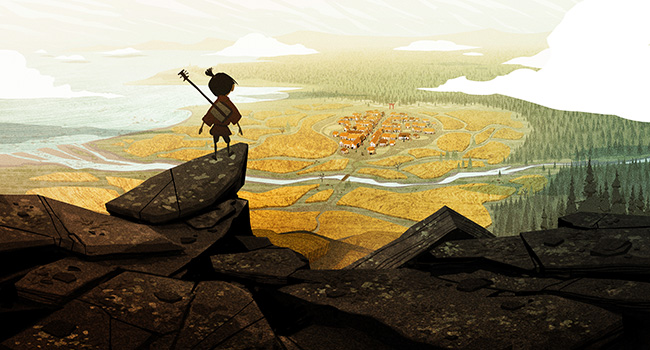Stop-motion animation is one of the most painstakingly intricate, beloved, and impressive forms of filmmaking on the planet. Stop-motion movies are so rare these days that we must take the time and effort to appreciate every instance of one that flits through theaters. Given the amount of craft they demand, it would be difficult to declare a stop-motion movie anything less than good.
But Kubo and the Two Strings sure tests that rule.
As I write this, the rest of the critical world is already fawning over this movie. My opinion without a doubt belongs to a very small minority. Perhaps I was more willing than others to look past the mesmerizing visuals; perhaps I have no heart: but through my eyes, Kubo and the Two Strings is the most beautiful of styles and the most vapid of substances.
The marvelous animation unfolds the story of Kubo, a young boy with a two-stringed instrument and nondescript magical powers that help him control paper like a Hogwarts student who only took origami classes. He takes care of his nearly catatonic mother and hides from his grandfather, a vague villain who stole one of Kubo’s eyes years ago and is presumably out for the other.
Later on in the story there’s a talking monkey, a human/beetle hybrid warrior, giant underwater eyeballs and flying masked witches. You certainly cannot fault Kubo and the Two Strings for boldfaced originality during a summer full of recycled ideas.
The sometimes bizarre, frequently charming high fantasy concepts seem like an excuse to fill the movie with infinitely inventive visuals, and thank god for it. Stop-motion has never looked this outstanding; this breathtaking and stunningly perfect. Gone is the stilted movement of the stop-motion’s early days: this handcrafted miracle rivals the best of CG animation but with ten times the character.
Fantastical scenes that you must see to believe are filtered through unbelievable artistic talent. Kubo and the Two Strings isn’t just pretty — it’s a spotless reflection of the time and effort that brought it to life.
It’s a shame then that the dialogue, characters, twists, pacing and general narrative substance are so lazy and thoughtless. The glorious visuals cannot mask what is at heart more unoriginal kids’ fare. Character interactions and battles feel scattered and random, the adventure is so low-stakes that it borders on dreadfully boring, plot twists simultaneously come out of nowhere and are completely predictable, and the dialogue is beyond cheesy. A character speaking in the movie was usually accompanied by my real life groaning.
Most of Kubo and his gang’s accomplishments happen entirely by coincidence, so few of the happy conclusions feel earned. The humor is obvious and childish, prompting a diverse and talented voice cast (Charlize Theron! Matthew McConaughey! Ralph Fiennes!) to force out cringe-worthy lines every few seconds. Kubo and the Two Strings tries to utilize mature themes, but it mistakes spouting platitudes about “stories” for nuance.
The animation and direction may be revolutionary, but the rest of the film is frustrating. Kubo has a catchphrase: “if you must blink, do it now.” That may ring true visually, but I wish I could have brought earplugs.
★★½ (2.5 out of 5)




